January 2026

The medical cannabis market is anticipated to grow from USD 16.32 billion in 2025 to USD 52.23 billion by 2034, with a compound annual growth rate (CAGR) of 13.8% during the forecast period from 2025 to 2034. The rising prevalence of chronic pain, growing research and development, and growing awareness drive the market.
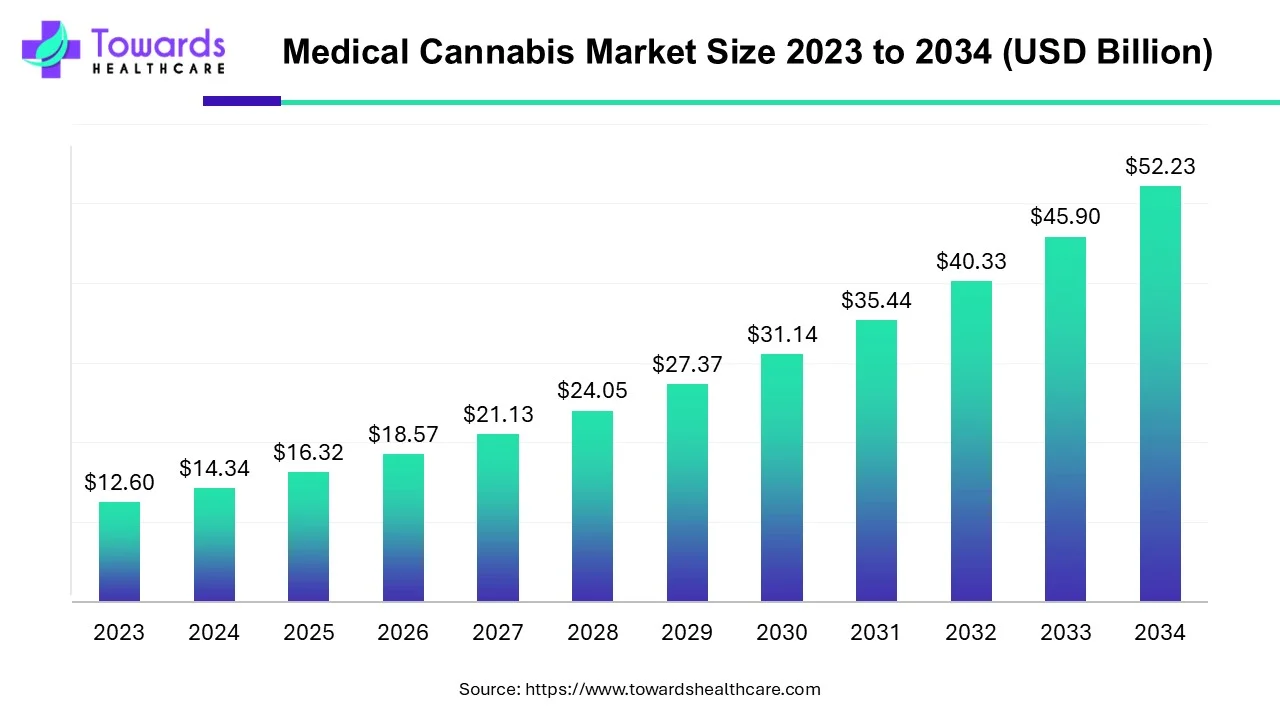
In 2023, according to the World Health Organization, it is estimated that around 50 million individuals are suffering from Epilepsy and showing a greater risk of premature death due to epilepsy. Medical cannabis hits high notes for Epilepsy, Chronic Pain Management and Rare Diseases.
Medical cannabis is obtained from the Cannabis Sativa plant and has been used for centuries due to its potential therapeutic benefits. Cannabis contains two main active compounds: Tetrahydrocannabinol (THC) and Cannabidiol (CBD). THC is known for its psychoactive properties, whereas CBD is non-psychoactive and has a variety of health benefits. The human body contains an endocannabinoid system (ECS), which regulates various physiological processes. Cannabinoids found in medical cannabis interact with receptors in the ECS, influencing processes such as pain perception, immunity and mood. One of the primary applications of medical cannabis is pain relief and it is used for various symptoms and diseases. THC can help alleviate chronic pain by altering how pain signals are processed in the brain. CBD, on the other hand, may have anti-inflammatory and analgesic properties without causing the "high" associated with THC. Medical cannabis is also utilized to manage nausea and vomiting, often in patients undergoing chemotherapy. THC can help reduce these symptoms and improve the quality of life for individuals undergoing cancer treatments.
In some cases, medical cannabis is prescribed for muscle spasms and spasticity associated with conditions like multiple sclerosis. The cannabinoids' muscle-relaxant properties may provide relief for these symptoms. It's crucial to highlight that the legal status of medical cannabis varies widely around the world and even within different regions of a country. Some places have legalized its use for medicinal purposes, while others still have strict regulations or complete prohibition. Before considering medical cannabis, individuals should consult with healthcare professionals to discuss potential benefits, risks and legal implications based on their specific health conditions and local regulations.
| Metric | Details |
| Market Size in 2024 | USD 14.34 Billion |
| Projected Market Size in 2034 | USD 52.23 Billion |
| CAGR (2025 - 2034) | 13.8% |
| Leading Region | North America |
| Market Segmentation | Ilray Inc., Canopy Growth Corporation, Aurora Cannabis Inc., Endoca, Curaleaf Holding Inc., Medical Marijuana Inc., Green Thumb Industry |
| Top Key Players | By Product Type, By Derivative, By Route of Administration, By Application, By Distribution Channel and By Region |
To gain a competitive advantage in the production of premium medical cannabis, growers are looking to artificial intelligence. A new degree of understanding and control is available to farmers thanks to AI algorithms. In order to forecast the ideal circumstances for plant health and productivity, these intelligent systems are able to evaluate an infinite number of data points in real time. In addition to improving the medical cannabis's quality, this also makes it more consistent, which is important for uses in medicine where exact dosage and consistent results are crucial. Artificial intelligence (AI) helps decrease waste and lessen the environmental impact of cannabis growth by determining the best growing conditions.
In states where medical marijuana is sanctioned, its approval extends to a diverse range of medical conditions, such as
It's imperative to recognize that some endorsed applications lack robust scientific validation. This discrepancy arises, in part, from the challenge researchers face in conducting comprehensive studies on a substance that, despite state-level approval, remains federally prohibited. The intricacies of this legal landscape contribute to limitations in establishing conclusive evidence for certain medicinal uses of Cannabis. More and more folks are realizing the amazing health benefits of medical cannabis, and it's causing a big demand boost in the market. People are getting hip to the therapeutic perks of cannabis-based products and as we all get more comfortable with using cannabis for medical reasons, the demand is shooting up. Ongoing research backing up its effectiveness also plays a role, making these products even more popular. It's like everyone's realizing that cannabis is a legitimate and valuable part of taking care of our health.
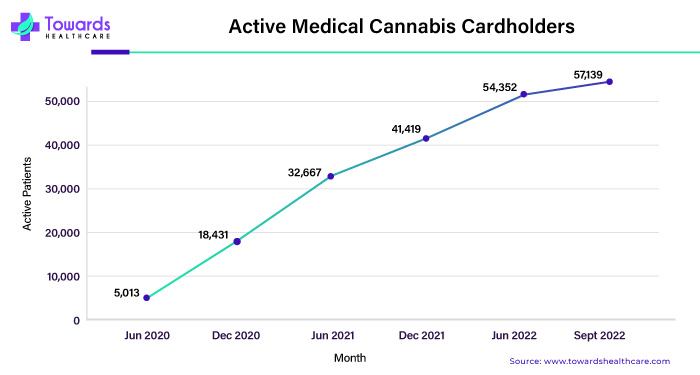
A cannabis patient cardholder is someone whose state's regulatory body has issued a medical marijuana card or license. This card verifies that the holder has a qualifying medical condition that makes them eligible to use cannabis for therapeutic purposes.
The FDA hasn't endorsed marijuana for health issues, but it has given the thumbs up to two prescription medications featuring synthetic cannabinoids.
FDA-Approved Medical Cannabis Drugs:
What sets these drugs apart from medical marijuana is the ability to regulate the active ingredient precisely, ensuring a consistent and known dosage each time. This level of control contributes to a more reliable and predictable therapeutic experience.
Epilepsy is a persistent neurological condition affecting individuals across all age groups. Globally, approximately 50 million people grapple with epilepsy, marking it as one of the most prevalent neurological disorders. Alarmingly, around 80% of those affected reside in low and middle income nations. With proper diagnosis and treatment, up to 70% of individuals living with epilepsy could potentially lead seizure-free lives. Unfortunately, the risk of premature death is three times higher in people with epilepsy compared to the general population. Regrettably, a significant number of individuals in low-income countries, around three-quarters, lack access to the necessary treatment. Beyond the medical challenges, many regions worldwide witness people with epilepsy and their families enduring the burden of societal stigma and discrimination. Addressing these issues requires a concerted effort to enhance accessibility to proper care and eliminate misconceptions surrounding epilepsy. Research suggests that certain compounds in cannabis, such as Cannabidiol (CBD), may have anticonvulsant properties and could potentially help manage epilepsy. CBD interacts with the endocannabinoid system in the body, influencing neural activity. However, it’s crucial to consult with a healthcare professional before considering any cannabis-related treatment for epilepsy, as the effectiveness and safety can vary and individual responses may differ.
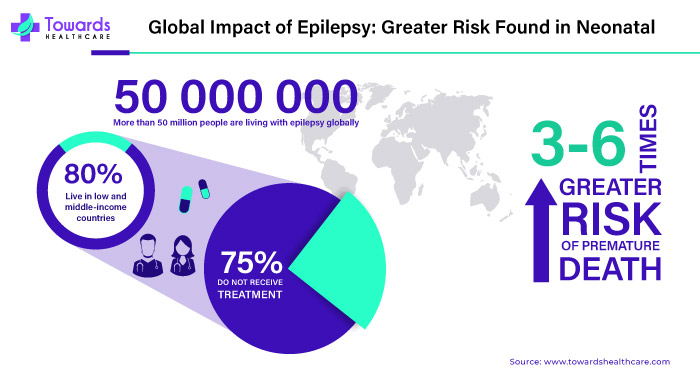
While some studies suggest that certain compounds in cannabis, particularly cannabidiol (CBD), may have anticonvulsant properties, the overall evidence supporting cannabis as a primary treatment for epilepsy is not yet conclusive.
For Instance,
Many individuals are finding relief through cannabis-based therapies, and as awareness grows, so does the demand for these medicinal products. This positive shift reflects a changing perspective on the potential benefits of cannabis in managing epilepsy, providing hope for those seeking alternative, effective treatments and increasing demand for medical cannabis in the market.
The challenge of legal and regulatory issues in the medical cannabis market is like facing a tricky obstacle course. Imagine each country having its own set of rules – some straightforward, others complex. The first hurdle is the patchwork of regulations globally; what's legal in one place might be strictly prohibited in another. The clash of rules between regions adds complexity, creating a regulatory puzzle. It's like trying to follow a map with conflicting instructions, making the journey more challenging. Concerns about misuse and safety act as barriers. Some fear that opening the doors to medical cannabis could lead to problems. This concern adds an extra layer of difficulty, making the regulatory landscape akin to a tricky obstacle course that needs careful navigation.
Additionally, varying legal statuses across jurisdictions create complexities for companies operating in multiple markets. Despite its growing acceptance, navigating the evolving regulatory landscape remains a key factor influencing the expansion of the medical cannabis industry.
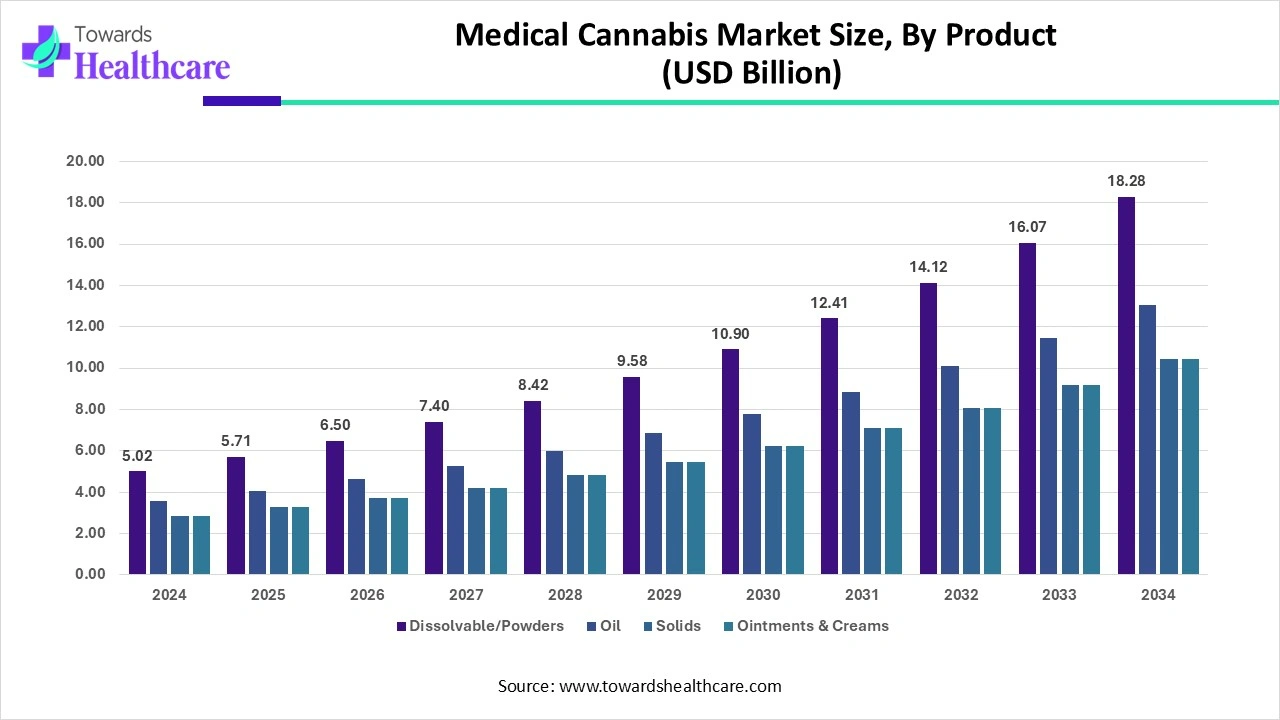
Medical Cannabis Market Size, By Product Type (USD Billion)
| Year | Dissolvable/Powders | Oil | Solids | Ointments & Creams |
| 2024 | 5.02 | 3.59 | 2.87 | 2.87 |
| 2025 | 5.71 | 4.08 | 3.26 | 3.26 |
| 2026 | 6.50 | 4.64 | 3.71 | 3.71 |
| 2027 | 7.40 | 5.28 | 4.23 | 4.23 |
| 2028 | 8.42 | 6.01 | 4.81 | 4.81 |
| 2029 | 9.58 | 6.84 | 5.47 | 5.47 |
| 2030 | 10.90 | 7.79 | 6.23 | 6.23 |
| 2031 | 12.41 | 8.86 | 7.09 | 7.09 |
| 2032 | 14.12 | 10.08 | 8.07 | 8.07 |
| 2033 | 16.07 | 11.48 | 9.18 | 9.18 |
| 2034 | 18.28 | 13.06 | 10.45 | 10.45 |
By product type, the dissolvable/powder segment held a dominant presence in the market in 2024. Powdered cannabis is most widely preferred as it can be dissolved in a suitable solvent and administered easily through the oral route. It results in rapid absorption and distribution throughout the body. The maintenance of an appropriate dose is also possible through powders. Technological advancements lead to the latest innovations, such as nanoemulsion technology to quickly dissolve powdered cannabis.
By product type, the oil segment is predicted to witness significant growth in the medical cannabis market over the forecast period. Cannabis oil is derived from the cannabis plant and is the most concentrated form of cannabis. It is widely used to get relief from pain, anxiety, depression, and sleep disorders. Oils are used as part of traditional medicines to support human health and well-being. Ongoing research efforts are made to find novel procedures for extracting cannabis oil in higher quantities.
By derivative, the cannabidiol segment held the largest share of the market in 2024. Cannabidiol is one of the 85 active cannabinoids within the cannabis plant. It constitutes a major percentage of all the ingredients, accounting for 40% of the plant extract. It is used for treating various chronic conditions, including seizures, chronic pain, and muscle spasms affecting the brain and spinal cord. The U.S. FDA has approved cannabidiol for treating Lennox-Gastaut syndrome, Dravet syndrome, and tuberous sclerosis complex, potentiating its demand for extended applications.
By derivative, the tetrahydrocannabinol segment is expected to grow at the fastest rate in the market during the forecast period. Tetrahydrocannabinol (THC) is predominantly found in the leaves and flowers of the cannabis plant. It is used to treat multiple sclerosis, nerve pain, and chemotherapy-induced nausea and vomiting. It also stimulates the appetite. It is available in different forms, such as smokable products, oils & tinctures, and edibles.
By route of administration, the inhalation segment held a major share of the market in 2024. Inhalation is the most preferred route of administration as it is directly passed into the bloodstream through the lungs and subsequently into the brain. Inhaled cannabis provides a rapid onset of action and reduced systemic side effects. A precise amount of dose is delivered to the lungs, avoiding unnecessary overdosing. Cannabis is inhaled by many hospitalized patients or unconscious people who are unable to take cannabis through the oral route.
By route of administration, the oral segment is anticipated to grow with the highest CAGR in the market during the studied years. Cannabis is administered through the oral route to increase medication adherence for all age groups. It is easy to administer and cost-effective, eliminating the need for skilled personnel or a specified device to ingest cannabis. It can eliminate the chances of breathing problems and the need for smoking. The oral route is preferred for treating nausea, loss of appetite, neuropathic pain spasticity, epilepsy, etc.
By application, the pain management segment registered its dominance in the market in 2024. The rising prevalence of chronic pain due to severe disorders such as cancer, neuropathy, and inflammation boosts the segment’s growth. It is estimated that neuropathic pain affects around 7% to 8% of the total population globally and increases to around 20% to 30% in people with diabetes. A 2023 comparative study between cannabis and opioids published in the Journal of Cannabis Research proved that cannabis can positively affect pain-related factors such as emotion and mood, functionality, and overall sense of well-being, in addition to reducing pain intensity.
By application, the neurological health management segment is projected to expand rapidly in the market in the coming years. Cannabis has immense potential in treating neurological diseases, such as neuropathic pain, migraine, multiple sclerosis, Parkinson’s disease, Huntington’s disease, and motor neuron disease. The increasing prevalence of these disorders potentiate the demand for cannabis as a therapeutic. A recent study published in the Journal of Parkinson’s on 367 people suffering from Parkinson’s disease found that 13% of the people use cannabis for treating their disorder.
By distribution channel, the hospital pharmacy segment led the global market in 2024. The segmental growth is attributed to the presence of skilled professionals, favorable infrastructure, and suitable capital investments. Pharmacists stay updated with the changing regulatory policies regarding extended applications of cannabis. Hospitals follow stringent regulatory guidelines and distribute cannabis within these guidelines. Hospital pharmacists also assist in managing the potential adverse effects of cannabis in patients.
By distribution channel, the online pharmacy segment is estimated to show the fastest growth over the forecast period. The rising adoption of smartphones and the rapidly expanding e-commerce sector augment the segment’s growth. Online pharmacy enables patients to order medical cannabis in the comfort of their homes. It also provides online consultation services and 24/7 facilities, attracting more customers. The increasing geriatric population also contributes to the segment’s growth.
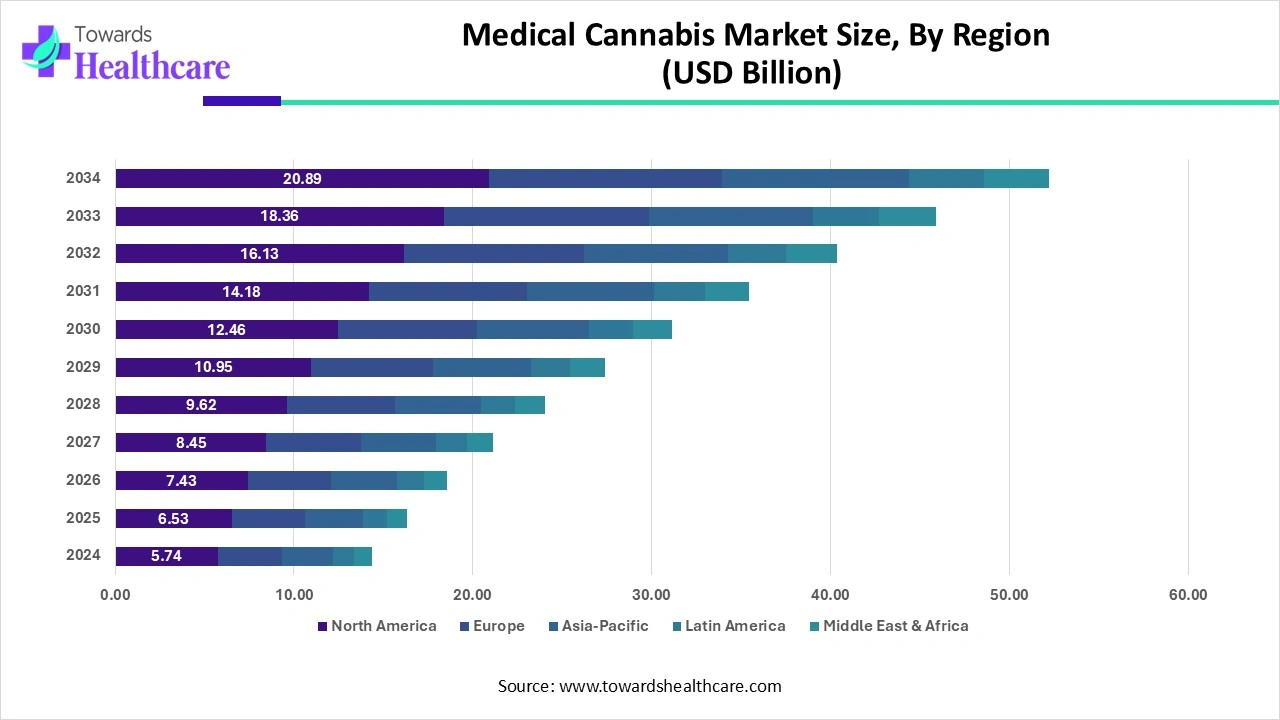
| Year | North America | Europe | Asia-Pacific | Latin America | Middle East & Africa |
| 2024 | 5.74 | 3.59 | 2.87 | 1.15 | 1.00 |
| 2025 | 6.53 | 4.08 | 3.26 | 1.31 | 1.14 |
| 2026 | 7.43 | 4.64 | 3.71 | 1.49 | 1.30 |
| 2027 | 8.45 | 5.28 | 4.23 | 1.69 | 1.48 |
| 2028 | 9.62 | 6.01 | 4.81 | 1.92 | 1.68 |
| 2029 | 10.95 | 6.84 | 5.47 | 2.19 | 1.92 |
| 2030 | 12.46 | 7.79 | 6.23 | 2.49 | 2.18 |
| 2031 | 14.18 | 8.86 | 7.09 | 2.84 | 2.48 |
| 2032 | 16.13 | 10.08 | 8.07 | 3.23 | 2.82 |
| 2033 | 18.36 | 11.48 | 9.18 | 3.67 | 3.21 |
| 2034 | 20.89 | 13.06 | 10.45 | 4.18 | 3.66 |
In North America, the geographical landscape for the medical cannabis market has seen significant changes in recent years. Canada has a well-established legal framework for both medical and recreational cannabis, allowing for cultivation, distribution and use. Several U.S. states, including California, Colorado and Florida, have developed robust medical cannabis markets. Mexico has also undergone legislative changes, decriminalizing cannabis for personal use and exploring avenues for medical cannabis legalization. The North American medical cannabis market exhibits a patchwork of regulations, with ongoing developments and shifting attitudes contributing to a dynamic landscape. As more regions and states embrace medical cannabis, the market is likely to continue evolving across the continent.
U.S. Market Trends
As of February 2024, 47 states, the District of Columbia, and 3 territories allow for the use of cannabis for medical purposes in the U.S. Of these, 14 states and 2 territories have a comprehensive medical-only program.
Canada Market Trends
The Canadian government’s Cannabis Act replaced the Access to Cannabis for Medical Purposes Regulations (ACMPR). The expenditure on cannabis in Canadian households reached over $1.7 billion in the second quarter of 2025, of which $119 million was for medical purposes.
For instance,
In the Asia Pacific, the geographical landscape for the medical cannabis market is marked by a mix of regulatory approaches. While many countries maintain strict regulations or even criminalize cannabis, some are exploring or implementing changes. Australia has made strides in medical cannabis legalization, establishing a framework for cultivation and distribution. In contrast, countries like Thailand and South Korea have taken steps toward cannabis decriminalization for medical purposes. However, the overall landscape in Asia Pacific remains diverse, with varying levels of acceptance and regulatory frameworks.
China Market Trends
The growing research activities lead to increased innovation in medical cannabis. Out of 606 patents, 309 patents of cannabis-related products are owned by China. In August 2024, the NMPA issued an announcement related to 7 substances, including cannabidiol, focusing on the production, operation, purchase, and transportation of these substances.
India Market Trends
India legalizes the use of cannabis for medical purposes. Boheco is a leading provider of cannabis-related products for oils and wellness essentials in India. It reported a revenue of Rs 7.5 crore in FY2025, an increase from Rs 5.3 crore in 2024. It evidenced a month-on-month growth of 30-40% in 2025.
Researchers conduct research activities to evaluate the use of medical cannabis for a wide range of chronic disorders. Rapid advancements in scientific research provide a deeper understanding of the benefits and risks of cannabis.
Key Players: Aurora Cannabis, Jazz Pharmaceuticals, and Lexaria Bioscience
Cannabis suppliers and distributors provide cannabis and related products to hospitals and community pharmacies through stringent regulatory policies.
Healthcare professionals provide a range of supportive and clinical services to patients. They also guide patients about the dose and delivery method for chronic pain and other disorders.
Barsha Man Pun, Finance Minister of the Government of Nepal, announced the legal cultivation and consumption of marijuana for medicinal purposes. He said that necessary laws would be framed for the commercial production of marijuana in the country. He allocated a budget of Rs 1.860 trillion for the fiscal year 2024-25.
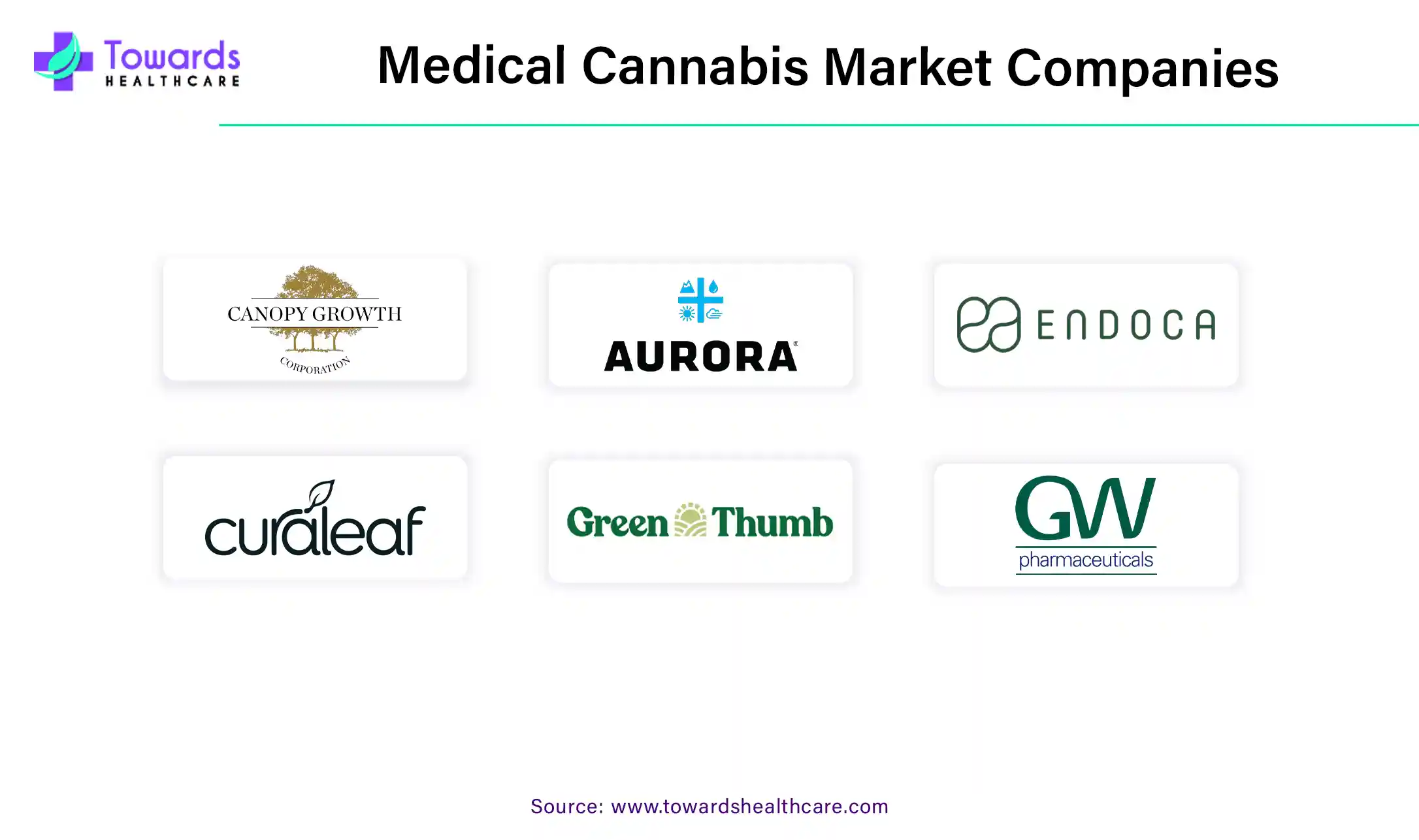
By Product Type
By Derivative
By Route of Administration
By Application
By Distribution Channel
By Region
January 2026
January 2026
January 2026
December 2025